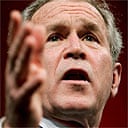The Bush administration's interference in climate change science has revealed "flaws that have developed in the functioning of our democracy", according to a leading US climate scientist.
The stinging attack on the power of the White House to distort the issue of climate change will come today in testimony to the House of Representatives committee on oversight and government reform.
Jim Hansen at Nasa's Goddard Institute for Space Science (GISS) in New York will say: "The executive branch seems to be exercising greater control in the functioning of our government, in ways that our forefathers probably did not imagine and almost certainly would not approve. This includes White House control of testimony to Congress, White House control of information that scientists provide to the public ... and most decidedly through control of the purse strings."
Although he will say political interference in science is not exclusive to the current administration, he adds: "Interference with communication of science to the public has been greater during the current administration that at any time in my career."
Dr Hansen is a leading figure in the climate science community and one of few scientists to speak out forcefully in public. He first testified on the issue before Congress in 1982 during a session organised by Al Gore. Some of his seminal 1989 testimony that helped catapult the issue into the public eye features in Mr Gore's documentary film on climate change, An Inconvenient Truth. In November, he was presented with the Duke of Edinburgh Conservation Medal, the World Wildlife Fund's top conservation award.
Dr Hansen will criticise the White House for successive cuts to Nasa's earth science research and analysis budget to what he calls "almost a going-out-of-business" level. He claims that this has meant that most planned launches of satellites that would collect valuable climate data have been cancelled or postponed, and that support for contractors, young scientists and students has disappeared. This will have "dire implications for future capabilities", he will argue.
This is happening at a time when Nasa research is yielding spectacular results. For example two small satellites that measure the Earth's gravitational field with remarkable precision found that Greenland is losing around 150 cubic kilometres of ice per year.
Dr Hansen will characterise the White House strategy in the following way: "One way to avoid bad news: stop the measurements! Only hitch: the first line of the Nasa mission is 'to understand and protect our home planet'. Maybe that can be changed to 'protect special interests' backside'."
After a lecture to the American Geophysical Union in December 2005, Dr Hansen's ability to speak out about climate science was curtailed by his Nasa bosses, who authorised the organisation's public affairs department to dictate which media interviews he was allowed to give. He was also obliged to submit a calendar of all planned talks and meetings and obtain prior approval for postings on the GISS website.
When Nasa's attempt to gag their scientist was revealed in the media, the organisation issued an unequivocal statement in support of scientific openness. But despite this, Dr Hansen will tell congressmen that efforts of political PR appointees are still restricting what scientists can say. "In no way has the impact of deception of the public about climate change been undone by Nasa's forthright decision in favour of scientific openness."
"The most troubling impact of the political interference with climate change science is the potential burden that we leave for our children and grandchildren," Dr Hansen will argue. He believes that people forced to leave their land by rising sea levels will know whom to blame. "If we continue on this course, failing to effectively address climate change, we will leave a heavy moral burden, and perhaps a legal burden, for our children."
